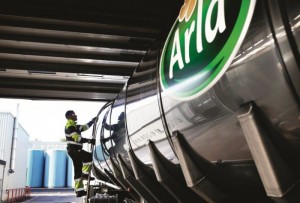Arla Foods UK Announces First Step in Drive to Create New Efficiencies

Arla Foods UK has announced a series of actions that it is proposing as part of a strategic review of its UK cheese business, logistics operations and the Arla Group’s three-year transformation programme, Calcium, where it will further create efficiencies for the benefit of its farmer owners, customers and consumers.
The proposals include creating a reorganised cheese business that will focus on meeting existing and new customer requirements as well as support its fast-growing brand and channel strategies.It will also be creating a logistics network that is able to move volume around more effectively to continuously improve its service levels as well as reducing the size of its corporate functions to ensure front line obsession in its commercial areas.
 As one of the UK’s largest cheese producers, Arla has identified a substantial opportunity to diversify its cheese production as well as improve efficiencies consolidating operations across its production and packing sites, where it currently has capacity which is not currently being fully utilised.
As one of the UK’s largest cheese producers, Arla has identified a substantial opportunity to diversify its cheese production as well as improve efficiencies consolidating operations across its production and packing sites, where it currently has capacity which is not currently being fully utilised.
As a result of this, Arla is announcing a proposal to cease production at its Llandyrnog creamery while potential opportunities for the production of other products at this site are explored further. Under the proposals current cheddar cheese volumes would move to its Taw Valley and Lockerbie creameries.In addition, Arla is also proposing the integration of all its cheddar cheese packing lines into its Oswestry packing facility, which would result in the closure of its smaller Malpas and Lockerbie packing operations.
The proposed consolidation, subject to the completion of the consultation process, could put 154 roles at risk of redundancy across Llandyrnog, Malpas and Lockerbie.
If the proposed plans proceed, Arla is looking to recruit colleagues into vacant positions within their site network and will be setting up links with local job centres, launching career fairs and providing outplacement support as well as working with other local food producers to find suitable vacancies.
Under these proposals, Arla does not anticipate any impact on its supply of Welsh milk and will endeavour to produce its current portfolio of cheeses dependent on demand from its retail or foodservice customers.
Tomas Pietrangeli, managing director of Arla Foods UK, comments: “This proposal enables us to not only drive efficiencies but also retain ample capacity to better meet the evolving needs of our customers in areas such as retail, foodservice and export.It’s also critical that we retain our approach to innovation and never compromising quality in our cheese business and we feel that these steps are the best to take to ensure our sustainability.”
He continues: “We recognise that this will be a difficult time for all those colleagues impacted by these proposals and our priority right now is to support them to manage this situation as best we can.We will now be entering full consultation with all our colleagues affected and their trade union or colleague representatives.”
Arla has also been reviewing its options to rebalance its logistics warehouse network and to consider whether it is making the most efficient use of its own resources, as well as the way it works with third party providers.It has identified that it could potentially transfer some existing Arla volume, which is currently serviced across its network and by its business partners, into its National Distribution Centre based at Stourton in Leeds.
At its head office in Leeds, Arla will be entering into a period of consultation with individuals in its corporate support functions which could put up to 15 roles at risk of redundancy and it will also be looking to support impacted colleagues secure other positions.
Tomas Pietrangeli adds: “We have also entered into a period of consultation with some of our logistics colleagues around work patterns and reward structuresanda number of our corporate function colleagues around their potential risk of redundancy.Our ambition is to minimise any potential impact on them.We will be continuously looking at ways in which we can transform our business to ultimately secure the best returns from our farmer owners.”



































